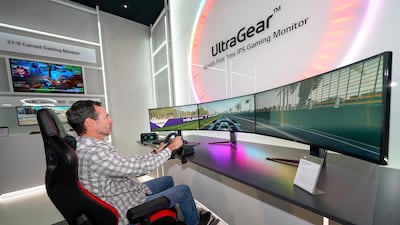The e-gaming market in the GCC will be worth $821 million (Dh3 billion) by 2021, almost $130m more than its value in 2017, offering opportunities to regional telecommunication companies looking to boost revenues through new business streams.
Video gaming is an “exciting opportunity for telecoms operators”, who can tap into this “rapidly growing market and diversify their business”, consultancy Strategy&, which is part of the PwC Group, said in a report released on Sunday.
The UAE, the second-biggest Arab economy, was the largest e-gaming market in the region in 2019 but it is likely to be surpassed by Saudi Arabia this year, it added.
Boom in the e-gaming industry will open new revenue streams for operators, who are struggling with a drop in voice business revenues.
“Gaming would increase data usage and bring extra revenue for operators. Significantly, this would allow them to generate more data about their customers, which in turn will help improve customer experience and increase monetisation,” said Strategy&.
Fixed-line voice market is forecast to drop 3.5 per cent year-on-year in the Middle East, Africa and Turkey region in 2020, whereas the mobile voice market will shrink by 1.9 per cent yearly, according to US-based researcher International Data Corporation.
Telcoms operators in the GCC, who successfully enter the gaming industry, would also be able to improve their “brand positioning” and customer loyalty, Strategy& said.
Last year, Etisalat — the biggest telecoms operator in the UAE — launched the first-ever cloud gaming service to promote e-gaming in the region and encourage non-gamers to join the ecosystem.
Consumer appetite for cloud gaming will rise rapidly in 2020 with the creation of new platforms such as Apple's Arcade and Google's Stadia, offering users the option to play games on-demand from virtually anywhere, hardware manufacture Lenovo predicts.
Gaming is currently the most profitable form of entertainment in the world, with the industry split into mobile games, e-sports streaming, console purchases and more. Worldwide, the gaming industry is worth $148.8bn, while the market in the Middle East and Africa value at about $4.8bn, just 3 per cent of the global value, according to a November report by market research firm Newzoo.
Industry experts said the regional telcos have an opportunity to increase the Middle East and African share of the global market by generating local gaming content. It will help them diversify their businesses and broaden their customer base.
“Global games devised by international developers have so far dominated this [the GCC] market,” said Hicham Fadel, partner with Strategy& Middle East.
“This makes it a particularly attractive proposition for telcos in the region, where more than half [of] the population is under [the age of] 25 years and there is a strong opportunity to create localised gaming content,” he noted.
Local operators can start with the distribution of games that will be followed by localising games or by making games relevant to the local audience.
“If this resonates with the players, they [telcos] can then take the next step, develop their own games and take the fight to global game publishers… it’s a step-by-step process.”
Games by international developers currently have the lion’s share of the Gulf market. The top mobile games played in the GCC today are PUBG, Intikam Al Salatin, Fortnite and Rise of Kingdoms.
“The demand for localised content remains strong and to an extent unfulfilled,” said Strategy&. "Arabising games or adapting images and the story-lines to the [reflect the] GCC culture", is one way to tap the market, it noted.
Regional players such as Beirut-based gaming studio Falafel Games and Amman-based Arabic mobile games publisher Tamatem Games have started to gain traction by developing culturally relevant content.


